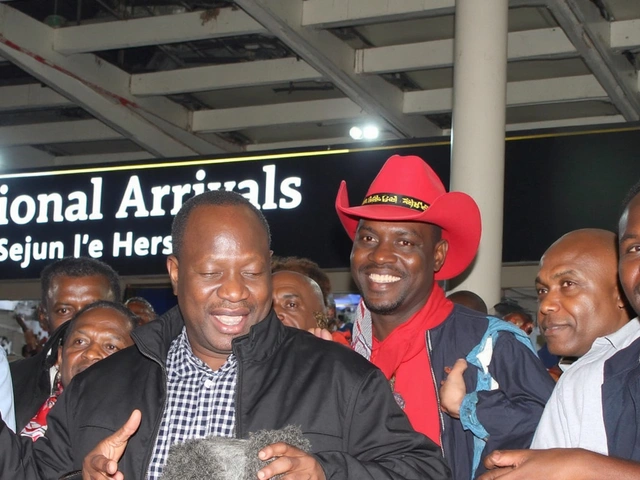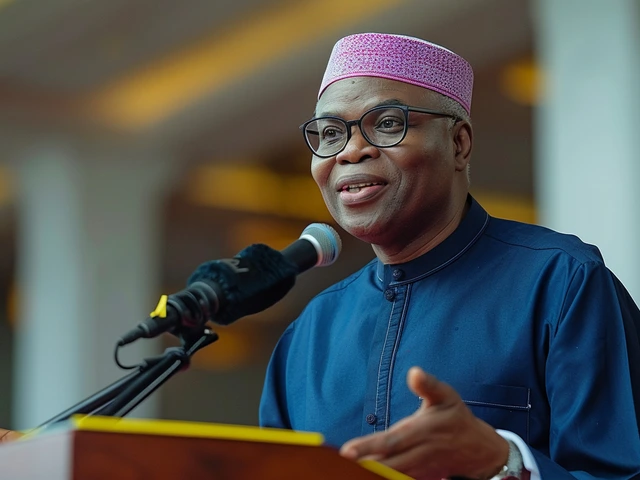Kanze Dena and George Kariuki Await Salaries Due to Bureaucratic Delays: Government's Position

Delayed Salaries Cause Concern
Isaac Mwaura, the Government Spokesman, recently shed light on the reasons behind the salary delays for former President Uhuru Kenyatta’s staff. According to him, the names of key personnel, including Kanze Dena and George Kariuki, have not yet been forwarded to the State House Comptroller, which is essential for their salary processing. This bureaucratic snag has left the staff in a financial lurch.
Kanze Dena, who served as the spokesperson for the former President, highlighted her difficulty in calculating the total amount of unpaid salaries accrued over the period. She emphasized that the staff, including herself, are currently left without clarity regarding their remuneration.
Comprehensive Entitlements
Under the Presidential Retirement Benefits Act, a retired President is entitled to 34 staff members. Mwaura pointed out that 33 of these positions are presently occupied and that the Office of the former President confirms those staff members are indeed on the government payroll, despite the ongoing salary delays. This positions the former President’s office in a precarious situation where legal adherence to entitlement provisions contrasts with financial disbursements.
Mwaura assured that these delays are purely administrative and suggested that with the timely forwarding of necessary information, the issue could be resolved. However, the prolonged delays have already caused notable discontent among the impacted staff.

Office Provision Controversy
The growing controversy also touches on the office provisions for the retired President. Former President Uhuru Kenyatta has declined to use the government-provided office in Nyari, Nairobi, citing its inadequate furnishing and maintenance. Instead, he expressed a preference for the government to lease his private home for official use, which Mwaura warns could violate procurement laws.
Kanze Dena defended Uhuru's stance, articulating that the Nyari office was not up to standard and that an office more suitable for Uhuru’s functions should be considered. She pointed to the precedent set by the late President Mwai Kibaki, who also chose an office that met his needs, asserting that Uhuru should be afforded the same prerogative.
Next Steps and Implications
This issue not only highlights the procedural flaws within the administrative framework but also underscores the personal prerogative and dignity given to a retired head of state. As the situation unfolds, it raises questions about the balance between governmental procedures and individual preferences. Whether Uhuru’s request will be granted without breaching procurement laws remains to be seen.
In the meantime, affected staff members like Kanze Dena and George Kariuki remain in a state of uncertainty. They are caught between the assurances given by the government spokesman and the hold-ups in bureaucratic processes. This highlights a broader issue within governmental operations where procedural inefficiencies directly affect the lives of individuals relying on timely salary disbursements.

Public Reaction and Transparency
Public scrutiny grows as these details come to light, urging greater transparency and efficiency within government operations. The bubbling frustration among the unpaid staff is understandable and feeds into a broader narrative that the government needs to streamline procedures to honor its commitments and support its functionaries more effectively.
Monitoring this situation closely, stakeholders both within and outside the government advocate for remedial actions to resolve these complications. Hopefully, timely and effective measures will address the salary delays and align office provisions to avoid future controversies.






Nicholas Mangraviti
June 12, 2024 AT 19:28Salary delays hurt people, but patience can breed resilience.
Jared Greenwood
June 30, 2024 AT 04:08The state’s red tape is choking the payroll pipeline, a classic case of administrative inertia. Every stakeholder knows the bottleneck lies in the missing name submissions to the Comptroller. This isn’t just a clerical slip; it reflects a deeper governance failure. We need decisive policy reform and immediate data transmission to unblock the salaries. Anything less is a breach of fiduciary duty.
Sally Sparrow
July 17, 2024 AT 12:48Kanze and George’s plight is a textbook example of how political patronage breeds complacency. The ministry’s excuses sound hollow when staff are left scrambling for basics. Such mismanagement tarnishes the legacy of any administration.
Eric Yee
August 3, 2024 AT 21:28Yo the whole thing feels like a sitcom where the script got lost. At least the vibes are chill but the cash flow not so much.
Sohila Sandher
August 21, 2024 AT 06:08Dont worry things will sort out soon. We just need the gov to send the names fast.
Anthony Morgano
September 7, 2024 AT 14:48Hey folks! I totally get the frustration, waiting for a paycheck is the worst 😅. Let’s hope the admin pulls through quick.
Holly B.
September 24, 2024 AT 23:28While I respect the concerns raised, it’s essential to note that procedural delays can affect even the most diligent offices. A collaborative approach may expedite the resolution.
Lauren Markovic
October 12, 2024 AT 08:08The salary backlog affecting Kanze Dena and George Kariuki is more than a simple administrative hiccup.
It underscores a systemic issue where essential personnel data fails to flow through the established channels.
When the State House Comptroller does not receive the necessary name lists, the payroll engine grinds to a halt.
This interruption ripples through families who rely on those wages for daily necessities.
Moreover, the public perception of the former president’s office suffers as transparency erodes.
Citizens begin to question whether privilege is being prioritized over accountability.
The government spokesperson’s reassurance that the delay is purely administrative provides little comfort to those awaiting pay.
A pragmatic solution would involve a swift audit of the missing documentation and an expedited submission to the Comptroller.
Simultaneously, establishing a tracking dashboard could prevent similar oversights in the future.
Such a tool would allow staff and oversight bodies to monitor the status of salary disbursements in real time.
In parallel, the debate over office provisions for a retired president raises separate concerns about procurement compliance.
Leasing a private residence for official use may appear convenient, yet it risks breaching established procurement statutes.
Historical precedents, like that of the late President Kibaki, illustrate that tailored solutions can be found within legal frameworks.
Therefore, a balanced approach that respects both the dignity of a former head of state and the rule of law is achievable.
Ultimately, timely action on salary payments and transparent office arrangements will restore trust and demonstrate good governance.
Kathryn Susan Jenifer
October 29, 2024 AT 15:48Oh great, another bureaucratic saga – just what we needed.